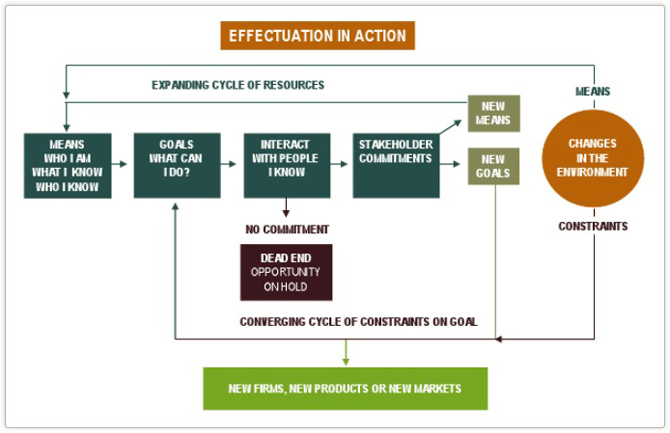Photographs: Illustration by Dominic Xavier/Rediff.com Madanmohan Rao
Prof Saras Saraswathy of the University of Virginia's Darden School shares some essential life lessons.
Every aspiring entrepreneur must check out the website Effectuation.org for useful success tips compiled and researched by Prof Saras Saraswathy of the University of Virginia's Darden School!
She describes effectuation as a methodology for entrepreneurs to interact with their ecosystem and co-create ideas, products, services, firms and markets.
It is a scientific approach that cuts across industry sectors and geographies, and is a logic for framing offerings and customers.
Effectual logic is different from causation, predictive methods or market research -- it is a more creative and transformative approach.
Instead of control of the future through prediction, it is based on control of the future through co-creation and thus avoiding the need for predicting the future.
Most aspiring entrepreneurs tend to give up on their entrepreneurial dreams because they think they do not have an idea, have no money, are risk averse, or do not have the right partnerships in place.
To tackle these challenges, Prof Saraswathy has come up with five effective actionable principles:
1. Bird in Hand Principle
Start with your means. Know who you are, what you know, and who you know -- rather than spend energy on defining and refining pre-set goals (eg. Husk Power Systems for electricity micro-grids in Bihar villages).
2. Affordable Loss Principle
Set affordable loss. Invest only as much as you can afford to lose, and let your partners invest only as much as they can afford to lose -- rather than describing expecte
3. Crazy-Quilt Principled returns (eg Richard Branson's founding of Virgin Airlines; Zhang Yin, founder of recycled paper firm Nine Dragon Paper Holdings in China, now the world's richest woman).
Form partnerships.
Talk to potential customers and partners and build a network of self-selected stakeholders who will jointly commit to the partnership -- rather than doing competitive analysis (eg. Greg Gianforte, founder of Right Now Technologies).
4. Lemonade Principle
Go with the lemons and make lemonade if that's what you have.
Embrace and leverage surprises -- rather than avoiding them (eg. Jim Poss, founder of Big Belly solar-powered garbage compactors).

5. Pilot in the Plane Principle
Co-create the future. Build products and services together -- rather than reacting to inevitable trends (eg Burt Rutan's SpaceShipOne suborbital air-launched spaceplane).
These principles have been unearthed from painstaking research involving hundreds of expert entrepreneurs -- defined as those who have founded and managed companies for over 15 years, been involved in multiple ventures, and led at least one venture to a successful IPO.

Please click NEXT to continue reading...
'The future is uncertain, so don't predict it -- co-create it'
Image: An illustrative chart of effectuation in actionPhotographs: Courtesy Yourstory.com
Much as science is taught to everyone in school and not just to aspiring scientists, so also entrepreneurship should be taught to everyone and not just to start-ups, says Prof Saraswathy.
Her website is packed with free resources such as articles, research papers, community member lists, and teaching materials; she herself shuttles between the University of Virginia and IIM-Bangalore, and gives talks in countries around the world to spread the entrepreneurship message to aspiring start-up founders, academics and policy makers.
Expert entrepreneurs see failure as inputs and even stepping stones to success.
Their strategy is to fail early, fail fast, fail cheap, fail smart and not fail alone.
Though one of their ventures may fail, they keep trying till the next offering or venture succeeds.
"Control is your strategy, and is not based on prediction or just vision. The future is uncertain, so don't predict it -- co-create it," explains Prof Saraswathy.
Strategy should be based on ways of shaping the future, not guessing it.
Successful entrepreneurs treat sales and pre-sales calls as a market research strategy -- that is the best way to find out what people want and how much they are willing to pay for it.
And the best way to find customers and partners is not to pitch to them but to ask for advice, insights, resources and participation.
How you frame the conversation and how you ask people in an open-ended manner is key for entrepreneurial success," advises Prof Saraswathy.



Comment
article